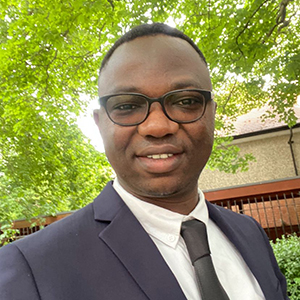Tochukwu Nweze, Ph.D.

Assistant Professor, Developmental Psychology
CONTACT INFORMATION
Office: BEHS 602
Email: tochukwu.nweze@psych.utah.edu
Research Interests
I am a developmental cognitive psychologist interested in how early childhood experiences (e.g., socioeconomic inequality, abuse, exposure to violence, dysfunctional family, etc.) shape developmental processes. I am particularly interested in how these adverse childhood experiences affect cognitive processes including different facets of executive functions. Current and past works have also examined how adverse childhood experiences (ACEs) affect other developmental processes including mental health and neurobiological processes. My research mostly uses complex statistical modeling to unravel cognitive deficits and other forms of developmental psychopathologies associated with a turbulent childhood and identify areas where the affected individuals have shown marked developmental adaptation and resilience following adversity. Statistical modeling frequently used in my research includes structural equation modeling, cluster approaches including growth mixture modeling, and latent class modeling.
Using longitudinal data, I also seek to understand nuances in the effects of adversity
across the lifespan, examining both within- and between-person variations in developmental
abilities. My research is multidisciplinary and I am open to collaborating with other
scientists across diverse fields including, clinical and neuroscience areas in an
attempt to understand how early childhood experiences affect children and young people,
but more importantly, how to help them achieve a well-adjusted and adapted life outcome.
Current research
My current research combines secondary data analysis and primary data collection to
address relevant research questions. I use large population cohort studies such as
the Avon longitudinal study of parents and children (ALSPAC), Millenium Cohort Study
(MCS), IMAGEN cohort, and soon-to-be-explored ABCD data. The longitudinal data provided
in these cohort studies present an appealing opportunity to closely follow children
exposed to all forms of adversity and investigate their development across the lifespan
and the continuity or disruption of these adverse experiences across generations in
relation to cognitive and mental health outcomes. I also undertake primary data collection.
This involves testing children in local schools in Salt Lake City. Data collected
in Salt Lake City will enable a test of how socioeconomic inequality and other dimensions
of adversity affect different facets of cognitive functions, including potentially
stress-adapted skills, under different stimulus and test conditions. In addition,
given how little we know of how adversity affects children and people beyond the Western
Educated Industrialized Rich Democratic (WEIRD) samples, I will also undertake international
data collection, particularly in the Global South. Data collected from low-income
countries would enable an examination of cultural and ecological factors that shape
early childhood experiences and how their effects unfold on developmental outcomes.
Opportunities for students
I am currently looking for a graduate student interested in investigating how childhood adversity affects cognitive functions. The candidate will be able to learn how to design and implement research in developmental science. There is also an opportunity to learn some statistical modeling, such as latent change score modeling, growth mixture modeling, and latent growth curve modeling, and use the knowledge gained from these models to publish from existing secondary data available in ALSPAC, MCS, or ABCD cohort.
There are also many opportunities for undergraduate research assistants to gain considerable
research experience. Interested candidates should be able to commit between 3-6 hours
per week and will take part in data collection in Salt Lake City. Ideal candidates
should be majoring in psychology or other allied behavioral sciences disciplines and
have a minimum GPA of 3.5. They should also have basic knowledge of computer applications,
including proficiency in Microsoft Excel which is useful for data entry.
Education
Ph.D., University of Cambridge (Cognitive Neuroscience, 2022)
M.Sc., King's College London (Neuroimaging, 2017)
Nnamdi Azikiwe University, Awka (Psychology, 2014)
Selected Publications
Nweze, T., Banaschewski, T., Ajaelu, C., Okoye, C., Ezenwa, M., Whelan, R., ... & IMAGEN Consortium. (2023). Trajectories of cortical structures associated with stress across adolescence: a bivariate latent change score approach. Journal of Child Psychology and Psychiatry, 64(8), 1159-1175.
Nweze, T., Ezenwa, M., Ajaelu, C., & Okoye, C. (2023). Childhood mental health difficulties mediate the long‐term association between early‐life adversity at age 3 and poorer cognitive functioning at ages 11 and 14. Journal of Child Psychology and Psychiatry, 64(6), 952-965.
Nweze, T., Ezenwa, M., Ajaelu, C., Hanson, J. L., & Okoye, C. (2023). Cognitive variations following exposure to childhood adversity: Evidence from a pre-registered, longitudinal study. Eclinicalmedicine, 56.
Nweze, T., Nwoke, M. B., Nwufo, J. I., Aniekwu, R. I., & Lange, F. (2021). Working for the future: Parentally deprived Nigerian children have enhanced working memory ability. Journal of Child Psychology and Psychiatry, 62(3), 280-288
